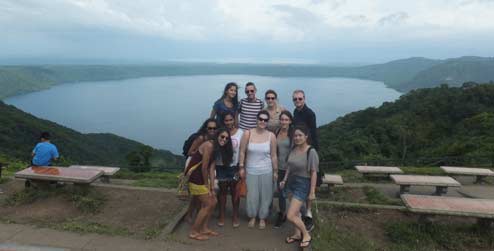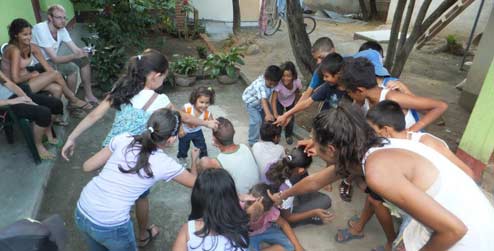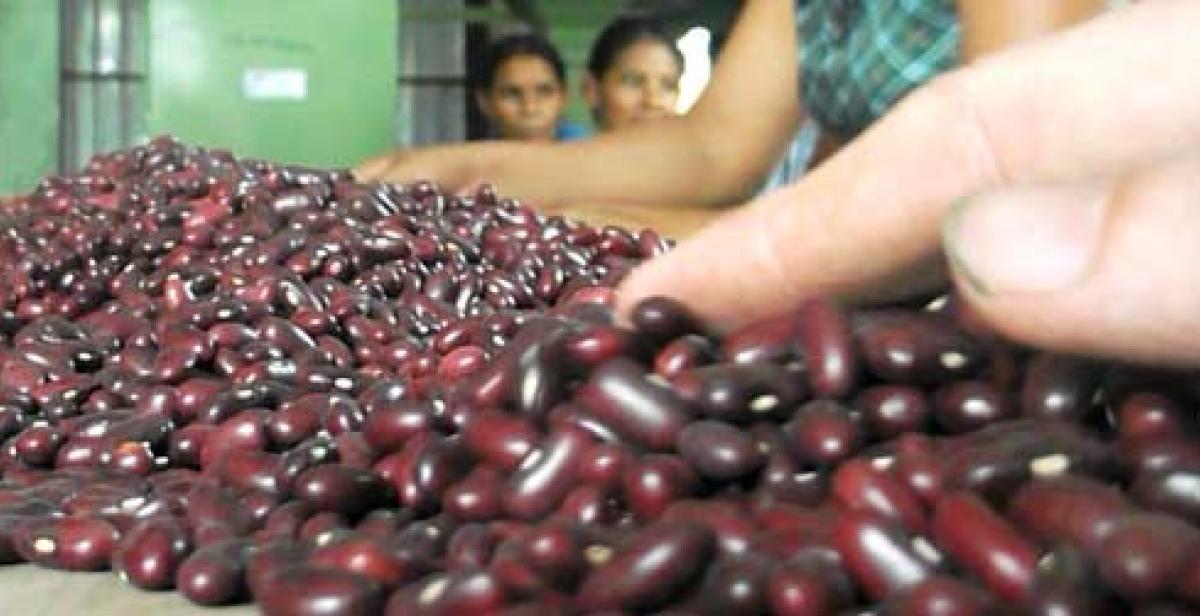Rivers run through me
Mountains bore into my body
And the geography of this country
Begins forming in me
Turning me into lakes, chasms, ravines,
Earth…
- Gioconda Belli, poet
This is a beautiful poem we found written by Gioconda Belli. Belli was an active participant in the Sandinista struggle against the Somoza dictatorship and her work for the movement led her being forced into exile in Mexico. We felt like it was a striking poem to use as an introduction for our time so far in Nicaragua.
іHola! Somos diez voluntarios trabajando con Progressio para mejorar el desarrollo sostenible en Nicaragua.
We arrived into Managua on October 2nd after a long journey from the U.K and were warmly greeted by our in-country staff and team leaders. We spent a night in a hotel catching up on missed sleep, and the next day went for lunch at Laguna de Apoyo. This is a beautiful crater lake said to be the country’s cleanest and deepest with supposed healing powers.

As you can see, it was a breathtaking sight.
Friday 5th October
We are living in the centre of a sleepy village called Mozonte in the department of Nueva Segovia, which is where we will be working. Since arriving in Nicaragua at the beginning of October we have eaten the national staple of gallopinto, AKA rice and beans, begun to learn Spanish and met the Progressio national volunteers.
Since arriving we have been learning about the difficulties faced by the second poorest country in Latin America. We have particularly looked into the issue of food security and nutrition, which is a major concern here.
To give you some facts…
Only 15% of people in Nueva Segovia have access to clean and safe water
42.4% of homes are in extreme poverty
Chronic infant malnutrition is 25%, which reaches 50% in some parts of Nicaragua
Nicaragua is at a disadvantage in terms of food security due to low incomes and a lack of education, e.g. of the benefits of breastfeeding or the harms of eating processed foods.
As part of our project to overcome these issues we have begun conducting a census to measure the level of income, food security, food production and commercialization. The information gathered from this research show the areas we will be focusing on for Progressio’s development projects here in Nicaragua.
Monday 8th October
The group had a meeting in Managua with another NGO, the Fabretto Foundation. The Foundation focuses largely on education, working with around sixty schools to develop education centres and school gardens. The Fabretto Foundation has worked with 10,500 students so far, and they also work with small farmers to help build networks.
During the meeting we were shown the film Dreaming Nicaragua, an emotionally evocative film shot in 2009 to raise awareness of the extreme poverty experienced in some parts of Nicaragua. Shot by Marcelo Bukin in 2009, Dreaming Nicaragua follows no script and allows viewers to experience the lives of four young children living in extreme poverty.
Saturday 13th October
On the Saturdays in Mozonte, our Spanish teacher teaches English to children from Mozonte and surrounding areas, which we were very kindly invited to in order to assist in the lessons. We had a brilliant time, reading and singing songs.

Wednesday 17th October
The last two days have been busy! Yesterday we took a trip to Ocotal, the nearest town, with our Spanish teacher. First of all, we went to the small but bustling fruit and vegetable market to practice our Spanish! Afterwards we walked around the town, visited the church and were told a bit about Ocotal’s history in relation to the revolution. We went for dinner in the evening to practice our Spanish again…
Today each group met with their partner organisation, FENACOOP and CPCH.
The team working with CPCH is working largely with tourism and the indigenous communities in Nicaragua. Tourism is an area we want to develop in Mozonte in order to help boost the town’s economic growth. There are various elements that we will be working on to encourage tourism including, marketing, developing local events and one of our main areas of focus to improve the entrance to Mozonte….because as we know, first impressions count! We therefore decided on an objective to plant trees and flowers to make the entrance to Mozonte one to remember.
We needed to gather soil in order to plant the flowers and trees, but soil has to come from somewhere….in this case it was from a cow. We therefore spent a glamorous morning digging and gathering cow manure. It may not be the most enchanting job, but it is worth it to create a beautiful entrance for a beautiful town. =
Meanwhile, Ronald’s group was taken to the FENACOOP farm and bean processing factory in Totogalpa. FENACOOP is a cooperative farm that works with local indigenous women to provide some much needed employment in the area, paying fair wages and offering up to fifty hours a week of work. Profits are used to buy more fields so more crops can be planted.
The factory has been operating since January 2012 and produces beans (frijoles) and corn (maize). Fourteen women work from 8am-4pm on the production line whilst a handful of local men take care of the machines. All of the women are indigenous, something that Kiran found interesting. In fact, providing jobs for local indigenous people is one of FENACOOP’s aims, and Totogalpa is a community 80% made up of indigenous people.
We arrived in the morning and were shown around the farm. After the tour, we took up position on the production line next to the women and spent time sorting beans. The job was to pick out the bad beans. The noise was deafening and the work monotonous, but the women seemed happy.
We spoke to the women as a group and asked all of their names and a couple of other questions. Their ages ranged from 17 to 57 and almost all had children, so the importance of a cooperative factory paying fair wages was not lost on us. There are very few jobs in this area, and it is hard to imagine what jobs these women would be doing without FENACOOP. The majority of women have children; spousal abandonment is a big issue in Nicaragua and the factory provides much-needed employment in an otherwise economically desolate area.
We all enjoyed our time at FENACOOP, and we’re looking forward to working with them during the surveying process.
Monday 22nd October
This morning we did a pilot run of the survey to check the questions were clear. Each UK volunteer was paired up with a national volunteer, to help with the language barrier (the survey is obviously in Spanish).
The aim of the survey is to measure income and food security of indigenous families in four municipios (areas) in Nueva Segovia. The survey is a diagnostic tool and the next cycle of volunteers will be analysing it, so we needed to double check that it made sense to the people who would be answering the questions. We made a few minor changes, and now it’s ready to go over the next couple of weeks!
Blog by Progressio ICS volunteer Kristina Peters



